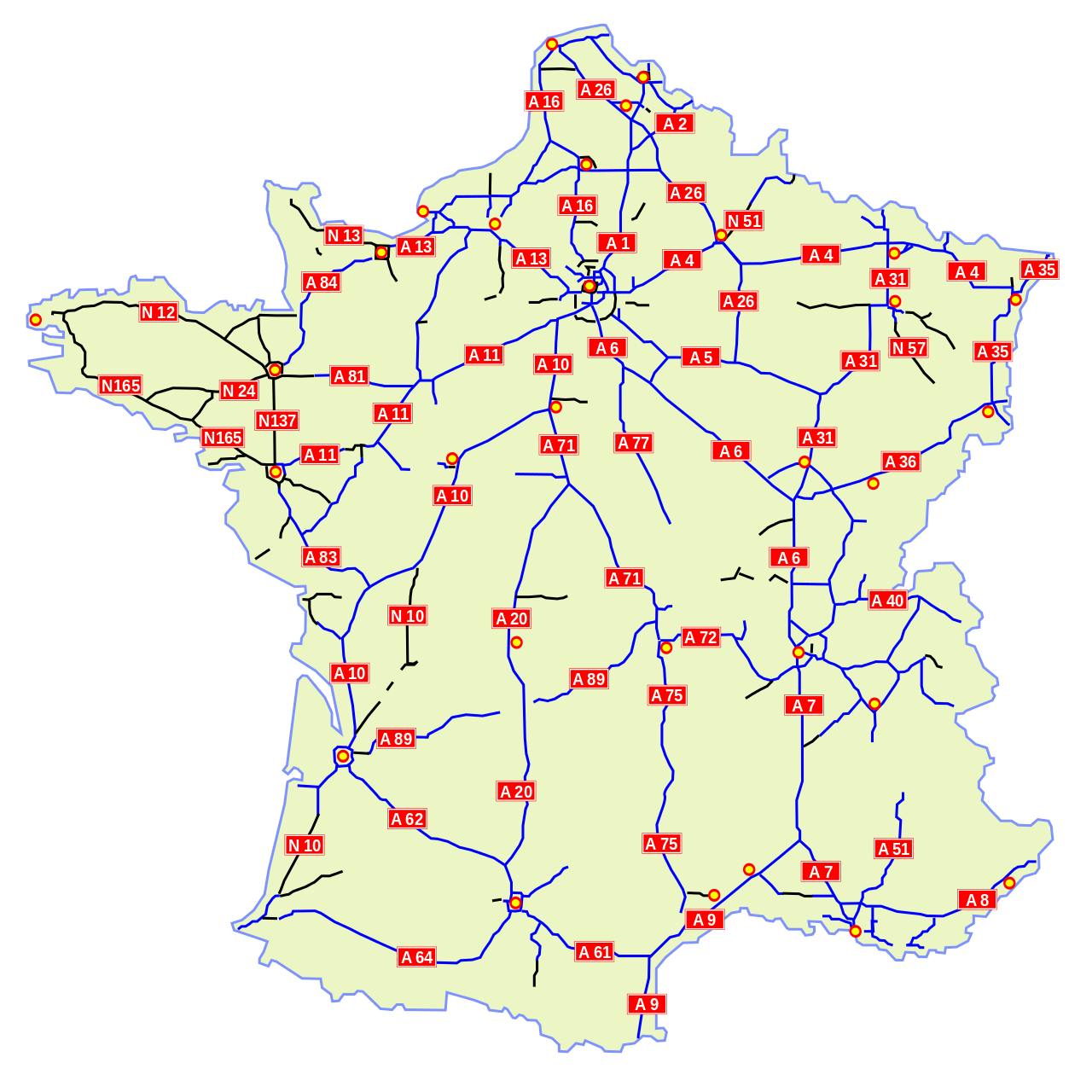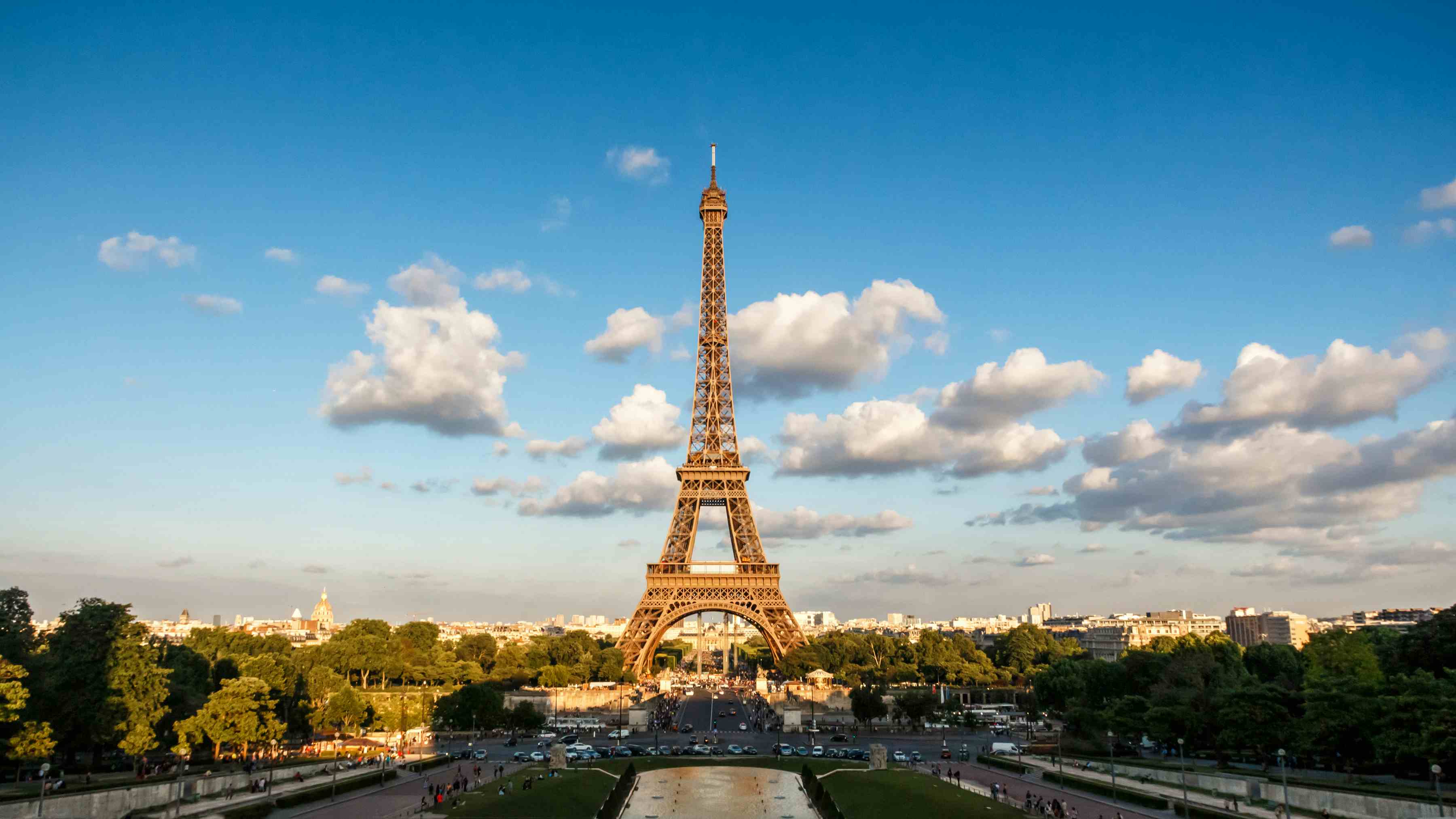Travelling to France by car
When driving in France, there are some rules you just take into account. On this page, you will find recommendations for a lovely and carefree holiday in France. Here you will find information about refuelling, paying toll charges and vignettes and other requirements that are applicable when travelling in France.
Mandatory to have in the car
There are a number of things that you must have in your car when travelling through France:
- Reflective safety vests for each person in the car, these must be within reach.
- A warning vest for use in the event of a breakdown on the road.
- A valid driving license and car registration document.
- Valid insurance for driving abroad.
- A warning triangle for use in the event of a breakdown or accident.
- A first aid kit with basic equipment.
- Alcohol tester (Alco-Test)
- A vignette for the motorways, when required.
Please note: Remember that some rules may vary depending on the region or time of year, so it is recommended that you inquire in advance about the rules that apply to the specific area you are traveling to.
Toll roads and vignettes
Toll charges apply for most motorways in France. There are also tunnels and bridges for which you must pay additional toll charges. While driving you will regularly come across toll gates, which are indicated by a blue road sign with the text péage. Do you need a toll vignette? Simply order the vignette for France here.
Traffic rules in France
- The maximum speed in France is 50 km/h in built-up areas.
- 80 km/h outside built-up areas (on dual carriageways without central reservation, with exceptions where 90 km/h is allowed).
- 90 km/h on dual carriageways with central reservation.
- 110 km/h on dual carriageway roads with four lanes
- 130 km/h on the motorway, unless otherwise indicated.
- The minimum age for driving a car is 18 years old.
- They drive on the right side.
- Wearing a seat belt is mandatory in the front and back of the vehicle.
- It is forbidden to drive with a mobile phone in your hand or wearing a headset.
- The permitted blood alcohol level is 0.5 mg/ml (for novice drivers this is 0.2 mg/ml for three years).
- Driving under the influence of drugs is strictly forbidden.
- It is recommended to drive with headlights on during the day.
- There must be a fluorescent safety vest and a warning triangle in the car.
Please note: Driving license holders who do not live in France, will not get any penalty points and will not be registered in the system.
Fines in France and charges
- If someone in France commits a speeding offense of up to 20 km/h on roads with a maximum speed of up to 50 km/h, they can expect a fine of €135.
- For a speeding offense of up to 20 km/h on roads with a maximum speed of 50 km/h or more, the fine will be € 68. For a speeding offense of more than 20 km/h, the fine can be € 135 and the driver may be disqualified from driving for a maximum of 3 years.
- When the maximum speed has been exceeded by more than 50 km/h, the fine will be €1,500 and the driver may be disqualified from driving for a maximum of 3 years.
- Driving through a red light can lead to a fine of €135 or more.
- A parking offense can lead to a fine of up to the amount for the maximum allowed parking time + a maximum of €50 for paid parking, and €35 or more for illegal parking.
- Driving without a seatbelt can lead to a fine of €135 or more.
- Using a mobile phone while driving, using earphones or headphones
- Using and possessing an anti-radar can lead to a fine of € 135 or more.
- Driving under the influence can lead to a fine of € 135 or more and a driving ban of up to 3 years.
- Driving under the influence of drugs can lead to a fine of up to €4,500 and a driving ban of up to 3 years and/or a prison sentence of up to 2 years.
- Violation of the environmental zone can lead to a fine of € 68 or more. Simply apply for the France environmental sticker.
Other fines can be for not having and using a safety vest (car) € 135 or more (payment within 15 days reduces the fine) or for cyclists € 22 or more, or for not having and using a warning triangle € 135 or more.
Charging point for electric cars in France
Currently there are about 65,000 public charging points in France. This number is approximately 65% of the number of charging points in the Netherlands (100,000). Despite the increase in the number of charging points, it is important to remember that travelling with an electric car in France still requires some preparation.
Refuelling in France
Different types of fuel are available in France, but not all types are equally easy to find. Here is an overview of the different fuels and their availability:
Petrol:
- E10 (Euro 95 E10, SP95-E10) is readily available in France.
- E5 (Euro 95 E5, SP95, Eurosuper) is fairly well available, but less than E10.
- Superplus 98 E5 (SP98 E5, Super Sans Plomb 98) is available at most petrol stations.
- E85 (Super éthanol-E85, Sans Plomb E85, E-85) is a biofuel mix of 15% gasoline and 85% bioethanol. This fuel is only suitable for special flex-fuel cars and is available at more than 3100 petrol stations. Please note: E85 is not suitable for regular petrol cars and can cause damage if accidentally being used to refuel.
Diesel:
- B7 (Diesel, Gazole, Gasoil) is available at almost every petrol station in France and contains a maximum of 7% biodiesel.
- B10 (Diesel B10) is available at a very limited number of petrol stations, mainly in the major cities, and contains a maximum of 10% biodiesel.
Please note: B10 is not suitable for all diesel cars and flex-fuel cars.
Gas:
- LPG (GPL, LPG, Autogas) is available at about 1470 petrol stations in France.
Fuel prices in France
- Euro 95 > 1.666
- Diesel > 1.792
- Gas > 1.004
*These prices were last updated on 06-01-2023.
Frequent traffic jams in France
The biggest traffic problems arise near the Alps, where several motorways converge and turn into secondary roads. This often leads to bottlenecks on the road. The following roads are often busy:
- A40 in the direction of Geneva and Chamonix
- A41 between Annecy and Chambéry
- A43 near Chambéry
- The Fréjus Road Tunnel
Best routes to France
There are a number of main roads you can take to reach the French Alps depending on where you are coming from:
- Route 1: From Luxembourg to Dijon and then to Lyon.
- Route 2: From Reims to Dijon and then to Lyon.
- Route 3: From Basel to Geneva.
Road map - France toll roads

NJ Vignette B.V. is an intermediary and applies for the vignette on your behalf and in your name. NJ Vignette B.V. charges a commission for this.
An agreement is concluded between you and the official authority of the relevant country that issues the vignette, with regard to the vignette requirement.
All prices on our website are including vat.

